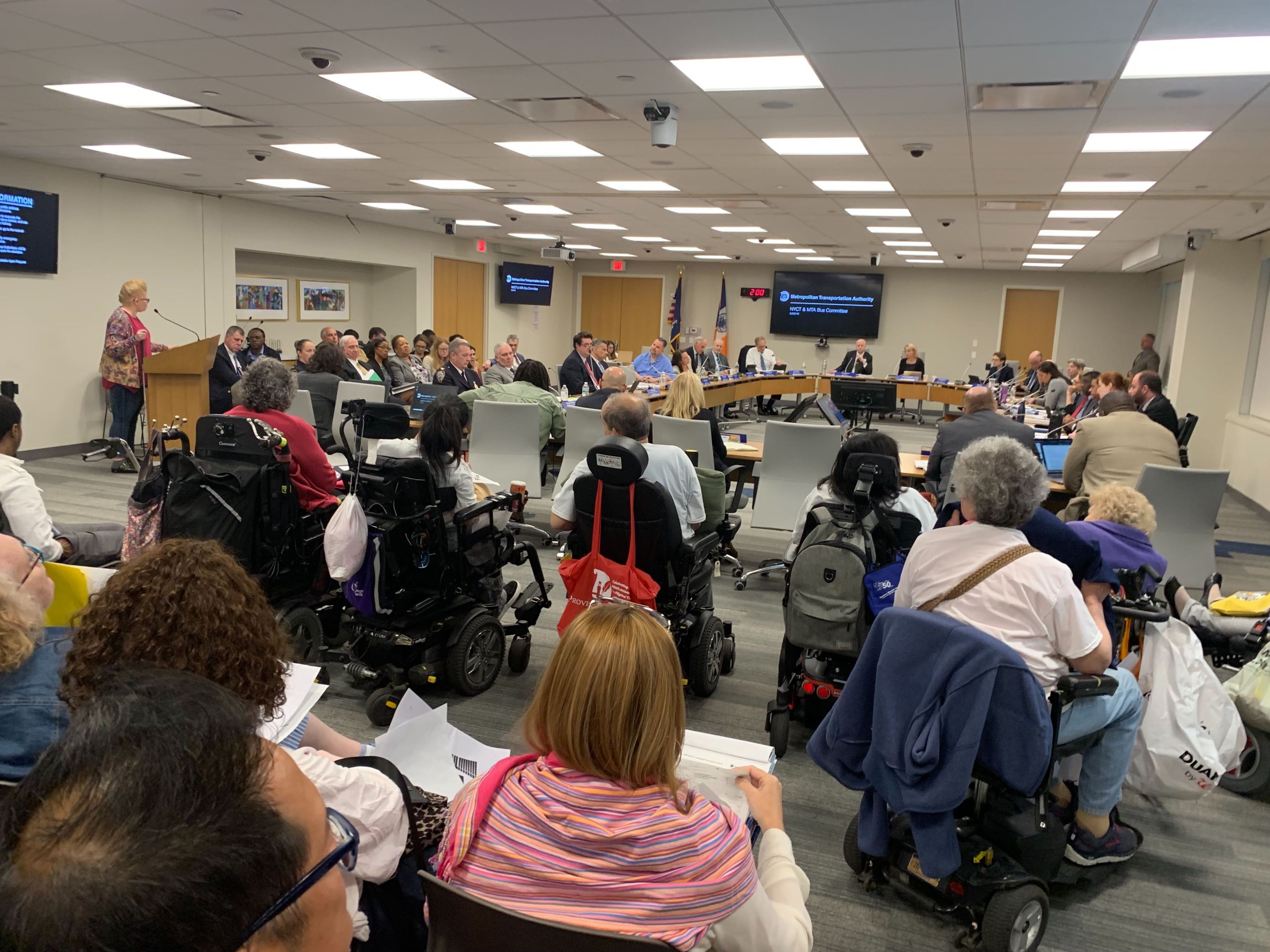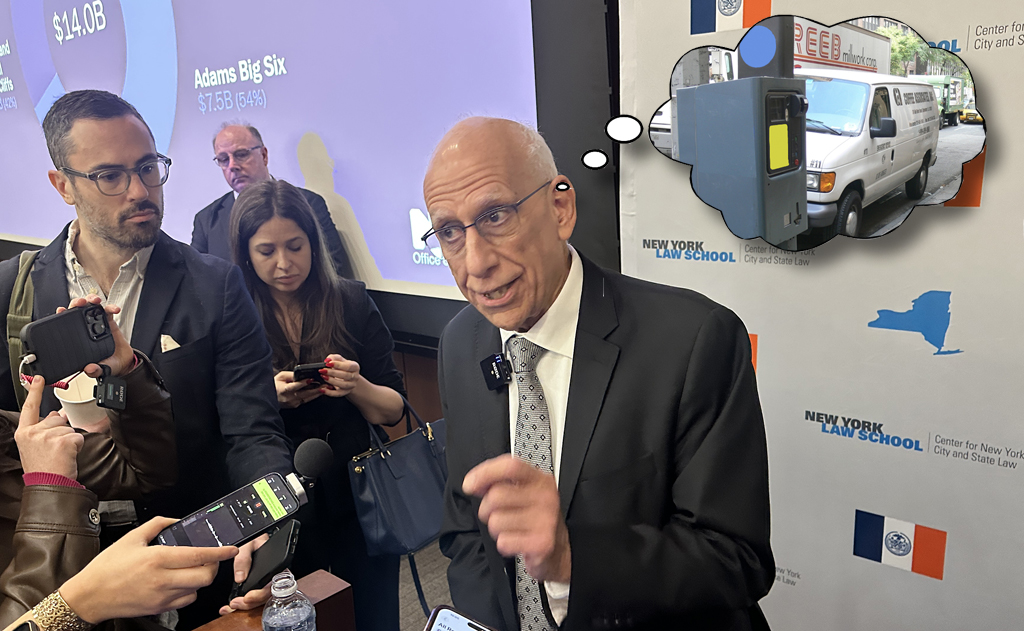City & State NY is hosting a full day New York in Transit summit on Jan. 30 at the Museum of Jewish Heritage. This summit will bring together experts to assess the current state of New York’s transportation systems, break down recent legislative actions, and look towards the future of all things coming and going in New York. Join Keynote Speaker Polly Trottenberg, commissioner of the NYC Department of Transportation, along with agency leaders, elected officials, and advocates. Use the code STREETSBLOG for a 25-percent discount when you RSVP here!
The MTA is talking out of two sides of its mouth, praising its dedication to expanding subway accessibility while also holding that same desperately needed work as a hostage in a funding fight with New York City.
So as the transit agency touts ambitious plans to make 70 more subway stations fully accessible by 2024, MTA Chairman and CEO Pat Foye is warning that the upgrades will be scuttled if New York City doesn't deliver its $3-billion commitment.
"We're hoping the city will match [the state's $3 billion] so that we can continue to deliver our critical accessibility capital improvements," Foye said during Thursday's MTA Board meeting.
It was the second time this month that the MTA suggested that city is standing in the way of the desperately needed upgrades. When Mayor de Blasio released his proposed Fiscal Year 2021 budget this month without a city contribution to the MTA's 2020-2024 capital plan, the mayor told reporters, "We are not going to keep handing over money, unless the money is going to be used well."
In response, MTA spokesperson Abbey Collins told the Post, "Without the city’s funding, we cannot meet our goal of making the maximum number of stations accessible."
Advocates for disabled riders call the MTA's targeting of accessibility upgrades a rhetorical form of hostage taking from an agency that has avoided — for decades — installing elevators, yet has spent close to $1 billion on cosmetic upgrades.
"The MTA isn't using signaling projects [or] holding up the expansion of the Second Avenue subway as leverage in these negotiations," Colin Wright, TransitCenter's senior advocacy associate said at Thursday's board meeting. "Why is it that only accessibility projects get treated this way?"
When asked why the MTA is threatening accessibility upgrades in the funding fight, Foye claimed that the MTA has been consistent in its messaging that contributions from the city and state would only go towards accessibility. Foye also said that Gov. Cuomo's budgeted contribution is tied to the Americans with Disabilities Act upgrades on the subway that are currently being litigated between the MTA and advocates for people with disabilities. However, this year's state budget language doesn't direct the money to any specific project, it only says (page 445): "Funds appropriated herein shall be made available in the event that the state elects to meet its commitment through direct payments."
Foye's suggestion that the agency has consistently linked the city's capital plan contribution to accessibility upgrades isn't borne out by the MTA's own rhetoric.
The agency's capital program report says nothing about what the city and state contributions will go towards beyond "core program projects." The report does say that congestion pricing funds "will be prioritized to support NYCT’s new subway signaling, cars, track, accessibility, as well as buses and bus system improvements and further investments to expand transit availability in the outer boroughs." (Emphasis added.)
Foye told Streetsblog, "I'm not sure what document you're referring to" when the capital program presentation was read back to him.
Here's the original language from the capital program when it was released to the public. Congestion pricing money specifically mentioned accessibility, city and state contributions did not pic.twitter.com/tkL1BRySCI
— Good Idea Dave (@DaveCoIon) January 23, 2020
In November, Foye told the City Council that "The city’s contribution would be used to fund accessibility upgrades on the subways," but it's the only time that position has been the official MTA position. The agency's many press releases touting its accessibility goals, sent both before and after that City Council testimony, also neglected to mention that the badly needed work would be specifically funded by the city's contribution to the capital program.
But even if the MTA had said from the start that city money was only for accessibility work, Wright told Streetsblog that it was "ridiculous" for the MTA to argue that city and state funding sources could go to only one specific kind of capital work.
"They're pushing this idea that this money isn't fungible, but of course, it is," Wright told Streetsblog. "There's no law that ties city contributions directly to accessibility upgrades. I don't think that the MTA would try to time [accessibility upgrades] on exactly when they think the city's contribution would come in, so that's why it raises even more questions about the MTA's timelines and what their priorities are."
Lawmakers who voted for congestion pricing told the MTA to find a better tactic to get the city to contribute $3 billion to the capital plan.
"Accessibility is not a pawn to be used in budget games," said Assembly Member Jeffrey Dinowitz of the Bronx. "Accessibility is about basic human dignity and the ability of all people to use our mass transit system regardless of whether they have disabilities, strollers, crutches, or whatever else limits their mobility. Whether or not New York City should contribute more to the MTA is a separate conversation and it should be conducted as such."
State Senator Andrew Gounardes also demanded a focus on building and not an internecine power struggle. "The legislature has done its part to ensure that we invest tens of billions of dollars in our mass transit system," Gounardes said. "Now we need to build the damn elevators."
As the debate rages, advocates for the disabled will rally on Tuesday morning to demand a legally binding timeline for elevator and escalator upgrades. The rally will include the family of Malaysia Goodson, who died last year when she fell down the stairs of a Midtown subway station that lacked an elevator.
"MTA, Put It In Writing!" rally, 60 Centre St., Manhattan, Jan. 28, 9 a.m. For info, click here.
Tomorrow (Tue 1/28), 9AM, 60 Centre St. Please join with strollers, wheelchairs, canes and more -- access is for everyone!https://t.co/5PoXfdg5jY (press rlease)https://t.co/VoJhSVqG0H (flyer - print and distro, post on bus shelters, subway elevators and more) pic.twitter.com/q6lfFH0idI
— Sasha Blair-Goldensohn (@sbgoldensohn) January 27, 2020
This story has been corrected to reflect the fact that an ADA lawsuit against the MTA is still underway.






